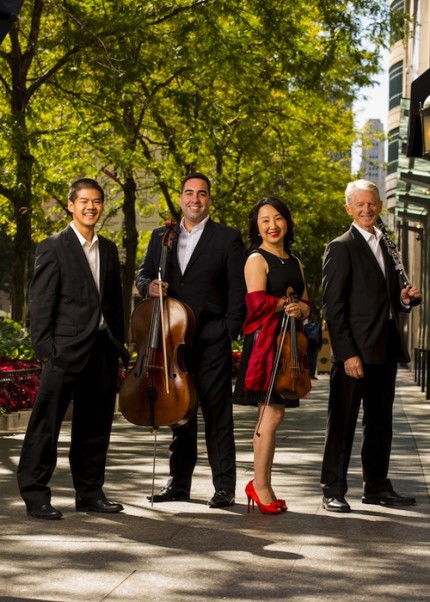Civitas Ensemble excels in American program
The Civitas Ensemble presented an engaging survey of 20th-century American works Sunday afternoon at the Merit School of Music. Civitas is comprised of Chicago Symphony members violinist Yuan-Qing Yu, cellist Kenneth Olsen, and clarinetist J. Lawrie Bloom, along with pianist Winston Choi. Sunday’s performance found them all performing at an exceptionally high caliber.
Yu, Olsen, and Bloom opened the concert at Gottlieb Hall joined by CSO members Kozue Funakoshi and Wei-Ting Kuo on violin and viola, respectively, for Bernard Herrmann’s two-movement clarinet quintet Souvenirs de Voyage. Herrmann is best known for his film scores to Citizen Kane and Psycho, and while Souvenirs (his last completed work) bears his cinematic tunefulness it remains ultimately forgettable. The opening Berceuse is smoky, rocking, and nocturnal, and was served well by Bloom’s husky clarinet timbre. The ensuing Canto amoroso is nostalgic and Puccini-esque, but despite sensitive treatment from the Civitas players, the music can be safely classified as fluff.
Peter Schickele’s Piano Quartet rounded out the first half and received a dynamic reading from the Civitas core members. The work is scored for the same forces as Messian’s Quatuor pour la fin du temps, and is similarly serious in tenor, worlds away from Schickele’s P.D.Q. Bach alter ego.
The players expertly handled the mercurial opening movement, conveying the idiosyncratic character of its contrasting textures and moods. Their rendering of the manic, blues-inflected second movement was incendiary, and reminiscent of the all-unison sixth movement of the aforementioned Quatuor. The wistful third movement was somber in Citivas’ hands, their playing imbuing it with an evocative mournful quality. The jubilant, terpsichorean finale had the air of a rarified hoedown with all four musicians incisively in sync, and cellist Olsen shining as a first among equals.
The same quartet of players was back after intermission for Stacy Garrop’s Little Bits, a set of miniatures written in 2000. This is a compelling work in which musical ideas all related to ideas of “bits” are aphoristically elaborated and then discarded. The opening “Sputter” was driving and pointed. “Crumbs” is intended to invoke Garrop favorite George Crumb and does so effectively with glissandi and savage gestures from the strings. “Pithy” is quirkily inflected and “Morsel” has all the instruments playing ethereally in the same range before evaporating into wisps. The closing “Double Dare” combines three ideas into a single movement: a driving motive, a Klezmer interlude, and a somber chorale. The Civitas players gave this likable, off-kilter work strong advocacy, and the Chicago-based composer was on hand to also receive the appreciative applause.
The afternoon closed with Copland’s Sextet, a chamber transcription of his 1934 Short Symphony, for which Funakoshi and Kuo rejoined the Civitas members to give a dazzling performance. The Allegro vivace was brimming with neo-Classical vitality and invention à la Stravinsky at the relevant period, bearing just the slightest hints of the populist idiom for which Copland would later become famous.
The musicians’ rendering of the severe Lento was architectural and dramatic, with the air of a nighttime cityscape. The finale was burbling and effervescent, with the performers’ effortlessly maintaining taut ensemble throughout their emphatic reading.
The Civitas Ensemble’s next local performance is April 9 as part of the CSO’s Chamber Music at the Art Institute of Chicago Series. That program features Golijov’s The Dreams and Prayers of Isaac the Blind and Piazzolla’sThe Four Seasons for Piano Trio. civitasensemble.org/
Posted in Performances



